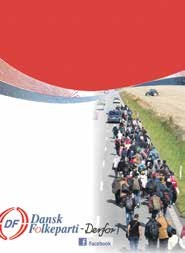(THIS ARTICLE IS MACHINE TRANSLATED by Google from Norwegian)
When Walter Benjamin analyzed German fascism in the early and mid-1930s, he had no doubt that fascism was largely a matter of aesthetics. Fascism was of course a political project, but a political project that took the form of an "aestheticization of politics". Nazism aesthetized modern alienation and turned it into a work of art, glorified war and destruction. Hitler was the inspired artist-master who created the eternal and perfect Aryan body by removing all the degenerate material (the Jews, the gays, the communists, etc.). German fascism allowed the masses to "manifest" as Walter Benjamin put it.
Hyggeracism thrives on the best in Denmark.
Faced with the return of fascism, it may be helpful to return to Benjamin's analysis and use it as a starting point for an analysis of the new fascism we have seen everywhere in the Western world in recent years. The election of Donald Trump, of course, stands as the exemplary example of new fascism – what I call late fascism. It is not simply a political phenomenon, or a phenomenon that is expressed politically as new parties and the dissolution of the political order we have lived in since the end of World War II. The new fascism is in many ways first and foremost aesthetic.
Fascism as Culture
Benjamin's analysis of fascism as an aestheticization of politics shows that fascism is not only a matter of political institutions and politics in the traditional sense, it is equally a matter of culture, of the images we create of society.

If we only focus on fascism as a question of politicians and political institutions, who is in the government and who is not, who wins the presidential election or forms a government, then we miss something – that is, how fascism permeates as a culture in everyday life. How fascism does not necessarily take the form of already known and circulating images of (interwar) fascism – swastikas, black uniforms – but takes on new forms and often takes over already existing objects and gives them a new content. Think of Trump's shadow hat, which is an integral part of America's popular culture, but which has acquired a very special significance and helps to create Trump's ultranational community, marking who is in America and who is not.
In a Danish context, Dannebrog has been completely taken over by DF. It is included as a background in all DF's campaign videos and posters and has become a picture of the exclusive national community they are fighting for.
When fascism is successful, it sneaks into the language and slowly normalizes its ideology. It is insidious because it imperceptibly expands the framework of nationalist and exclusionary statements, supersedes or uses traditional conservative views as a vehicle for its ultranationalism, which ends up appearing as a position among others in a political discussion. By using conservative attitudes or already circulating objects and symbols – like a Trojan horse, fascism sneaks into the political mainstream.

The development in Denmark is one case in point. Since the late 1990s, the entire party political spectrum has shifted markedly to the right, and today there is not just broad political agreement on a very restrictive asylum policy. The political parties struggle to mark themselves symbolically, struggle to antagonize and bully certain population groups as much as possible. In the spring of 2018, Minister of Foreign Affairs and Integration Inger Støjberg celebrated tightening number 50 of the Refugee Act with layer cake, after which DF put trump on by promising lemon moons by tightening number 100. Hyggeracism thrives in Denmark, which is one of the countries in the EU that the last 10 years have received the fewest refugees – only Eastern European countries such as Hungary, Poland and Romania have received fewer percentages. Nevertheless, over the course of twenty years, the Danish People's Party and its unequivocal ultranationalism have become the focal point and norm not only for a racist refugee and asylum policy in Denmark, but also for a large number of legal, economic and urban policies. This includes a so-called ghetto plan (where residents in certain residential areas, where the majority of the residents are immigrants or so-called descendants of immigrants, for example are punished with higher sentences), reintroduction of border controls, deprivation of citizenship and a number of attempts to make it unbearable to be a rejected asylum seeker in Denmark. DF has not yet been part of a government in Denmark, but has already won because their racism has become the norm. It is not only that their ideas have become like fish in water in the Folketing, but also that the affects that DF produces have become an integral part of everyday life. That is very much where fascism is today – as an emotional structure.
A particular language participates in the preparation of an acceptance of fascist actions. In other words, fascism as words, sayings, affects, gestures and memories, which together condense into a discourse, a narrative of an endangered community, a nation under pressure. It is Viktor Klemperer's description of how fascism conquers language using certain keywords and phrases, which are just as slowly naturalized and end up constituting a political reality. It is not enough to look at Trump, Pia Kjærsgaard or Marine Le Pen and shake their heads at them. It is necessary to listen to what they say, analyze their speech in order to identify fascism's fundamental narrative of national privileges and the need to protect the national community from external threats. For the repetitions work: In 2015, 49 percent of 75.000 students in 8th and 9th grade in the Danish primary and lower secondary school answered after a three-week course on democracy that freedom of speech should not apply to Muslims.
The endangered culture
The notion of being an endangered culture is repeated in all the various late-fascist communities from the Danish People's Party's notion of a «Muslim invasion» to Trump's rhetoric of «an American carnage». That is the essence of fascism's ultrapalingene ideology: the national community is in decay and must be restored. That is the promise we can always hear in fascism. Fascism promises a national restoration that the people can become one, purified and themselves. That's why 'the others' should go out, go away. "The others", "the strangers" threaten the national community and therefore they must be thrown out or prevented from entering. Trump promises to build a wall, and Salvini promises that no ships with migrants may dock in Italian ports. Whether it is the border between Mexico and the United States, or it is the border between Germany and Denmark or it is the Mediterranean, it must be closed so that the nation is kept clean. And this regardless of the costs for «the others», refugees and migrants who die in the Mediterranean or are trapped in Libya, or who fall ill in Danish deportation centers and commit suicide if they succeed in reaching Denmark.
The "good old days" were a time of mass production
region, mass production of cars, refrigerators, nuclear weapons and the
patriarchal family.
Fascism is a desperate search for a position and a firm reason that is not there. It is a desperate attempt to find a direction in a capitalist world characterized by the unraveling of traditions and the dissolution of handed down communities. Trump wants to return to the post-war Fordist welfare state, where the white worker ruled his family and faithfully showed up for work and produced added value for the American capitalist class. It was a time that stood in the sign of mass production, mass production of cars, refrigerators, nuclear weapons and the patriarchal family. The Danish People's Party's dream is for the family to gather at the dinner table, roast pork and beer for everyone, father and mother and children. “There is so much we need to take care of,” as the campaign slogan reads.

The utopia of late fascism is «the good old days», a time without feminism, migration and globalization, where there was order in the home, the national and the individual household, where race and property were linked.
Late fascism promises to restore an imaginary national greatness by removing unwanted elements. It walks on two legs, it will create order, and it will exclude.
Trump characteristically speaks of "Blue Lives Matter" and flatly dismisses the Black Lives Matter movement's critique of racial profiling and the police's constant shooting of young black men. The Danish People's Party has campaigned under the slogan "Violence out of Denmark – security now" (despite declining crime): The criminal minimum age must be lowered, criminal immigrants and their families must be expelled from Denmark, and the police must have added far more funds (it has they also got the last fifteen years). Unfortunately, there is nothing to suggest that these requirements will not be implemented. Thus, a large number of Danish People's Party landmarks have become law during the last fifteen years in Denmark: In 2015, border controls were introduced at the Danish-German border, the same year a requirement to detain refugees indefinitely was urgently processed through Parliament. , also in 2015, the so-called jewelry law was passed, which gives the police permission to visit newly arrived asylum seekers for valuables, in 2018 a masking ban was introduced (referred to by the DF as a burqa ban).
In 2019, it was enacted by placing rejected asylum seekers on an island that previously housed a virus research center.
When politics dissolves into business, as has happened in neoliberal globalization, the most important function of the state becomes to produce moral panic and control the disorder that constantly arises. Security will be the most important function of the state. Law and order and racist exclusion are combined. "America gets big again" when the aliens are kept out or controlled (by the police).
This is an excerpt from a lecture Bolt recently gave.


